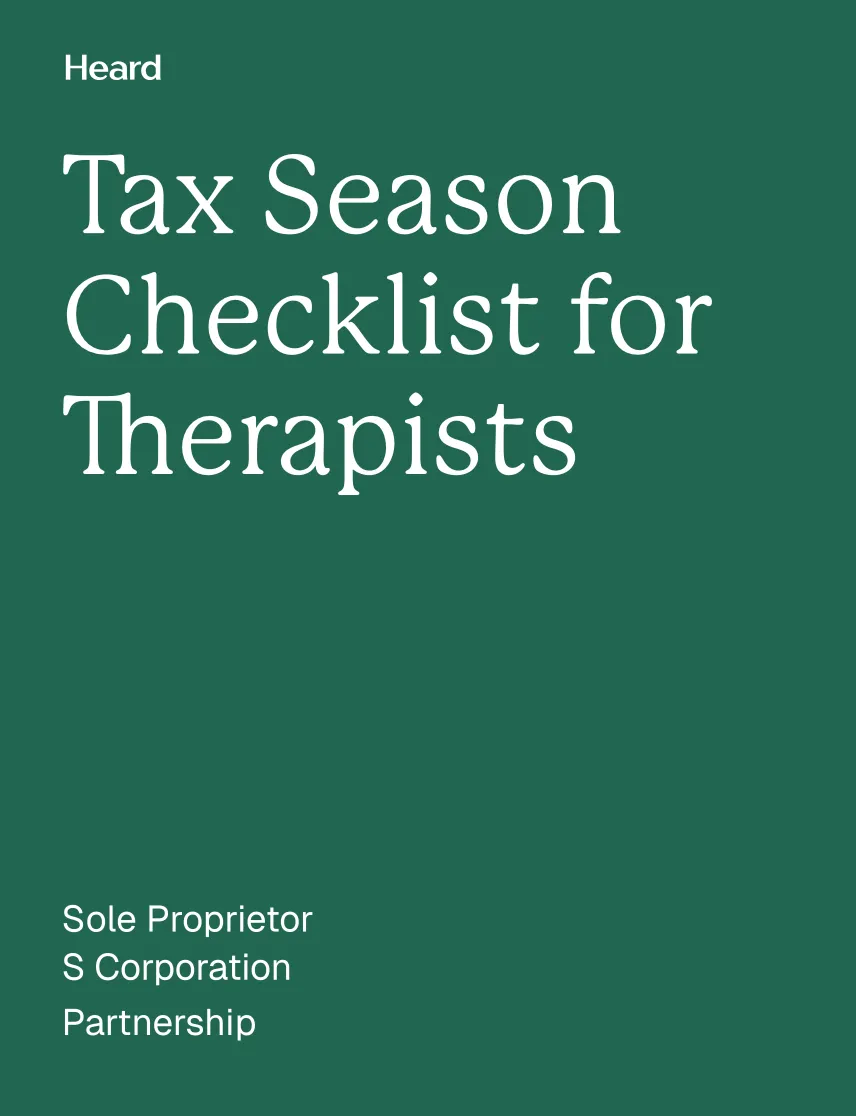When you run your own therapy practice, receiving a letter from the IRS or your state’s tax authority may cause a temporary spike in cortisol. The fact is, however, that most tax notices are innocuous, routine, and won’t result in a visit from a team of auditors.
So, grab your letter opener. Here are the steps to take when you get mail from the taxman.
Note: This article specifically refers to IRS notices. You may receive other notices from your state tax authority. In general, the best practices recommended here apply to any sort of tax notice you receive.
{{resource}}
Relax
If it’s true nobody writes letters these days, the IRS has yet to catch on. While the rest of us are messaging or emailing our friends, acquaintances, and loved ones, the IRS sends about 220 million notices by mail each year.
So, the fact you’ve received a physical letter doesn’t necessarily mean something serious is afoot. Your letter from the IRS could be a friendly reminder or a helpful update—the sort of thing you might expect to get as an email—if the IRS used email, that is.
The IRS will only contact you by mail. As a rule, the IRS never initially contacts taxpayers by text, email, or phone. If there’s an issue you need to resolve with the IRS, you’ll get a letter from them. If someone emails or texts you saying they’re from the IRS, report it as a scam.
Read the letter
Take the time to sit down and read the letter top to bottom, front and back.
Many accountants—as well as the financial professionals at Heard—field calls from panicked clients who’ve received letters from the IRS, but haven’t taken the time to read them.
In almost all cases, you can clear up any confusion you have by carefully reading the letter. Some specific details to look out for:
- The date the letter was sent
- What tax year is being referred to. This is a great place to start. Once you know which year the IRS is assessing, you can pull your tax returns for that year and refer to them.
- The letter’s number. Different types of IRS notices are identified with codes. Take note of any you see—they may help you figure out what to do later. (More on specific types of letters below.)
- A designated IRS phone number. Not every notice includes a phone number to call. But in cases when the IRS does include a number, take note of it. This typically the first resource tax accountants turn to when their clients receive notices.
- Any deadlines. It’s a good idea, on your first read through, to circle any dates that appear in the body of the letter.
- What penalty is being assessed. If you’re being assessed for a penalty, the letter will explicitly and specifically refer to it. Here’s a list of common penalties.
- What the IRS is asking you to do. Be assured, the IRS is not trying to confuse you. They’re giving you directions as clearly as they’re able. Even if the language is dry, take the time to parse out what it says, and make notes if necessary.
Double check where it came from
In some cases, you may receive a letter from a state tax authority that very much resembles a letter from the IRS—or one which ends up jumbled in a pile of IRS letters you’ve been putting off opening.
Check the letter’s stationery, the address it came from, and any URLs provided in the body of the letter, to identify whether it’s from the IRS or your State.
Recent mail sent by scammers includes notices that appear to come from state governments labeled “IMMEDIATE ATTENTION.” If you receive a notice from your State and it’s one you’re unfamiliar with, get in touch with state tax authority for confirmation before making any payments.
Deal with it immediately
Once you’ve figured out what the IRS is asking you to do, get to work on it ASAP.
Even if the deadline is months away, it’s better to deal with your IRS notice now. As a business owner, you’ve got plenty of items on your “to do” list, and time can slip away all too easily. It’s better to set aside some extra admin hours and tackle the problem immediately than to ignore it.
Get support if you’re not sure what to do
The IRS offers many online resources for taxpayers, as do most state tax authorities. If you’re uncertain about a notice you’ve received, the first step is to do some research online.
However, if you’ve done your best to understand your IRS notice and it’s just not clicking, or if the notice presents you with different options and you’re not sure which to choose, reach out to a professional. Your accountant can advise you or, if you use Heard, one of our team members can provide guidance.
{{resource}}
Different types of IRS notices
As mentioned earlier, you can identify different types of IRS notices based on their ID numbers.
They typically follow the format “CP__” or “LTR__,” or sometimes “IRS Letter ___,” where “__” is a two- or four-digit number. You can find them at the top or bottom right hand corner of the letter.
When you look at the notice’s ID, you can get a sense of what the IRS wants from you, even before you read the body of the letter.
Here are some of the most common IRS notices received by therapists who run their own practices.
Note: The actions recommended below are general advice to all taxpayers. To make sure they’re right for your particular situation, consult with an accountant first.
CP14: First Notice of Balance Due
What it means: You haven’t paid all your taxes for the year. The IRS is telling you how much you owe them, and how to pay.
What do do: Pay your tax bill using the IRS online portal. If you can’t afford to pay the total amount, contact the IRS and set up an installment plan.
CP501: Reminder of Balance Due
What it means: Typically, you’ll receive this notice after you’re received a CP14 and failed to act on it.
What to do: Pay your tax bill using the IRS online portal. If you can’t afford to pay the total amount, contact the IRS and set up an installment plan.
CP88: Delinquent Return Refund Hold
What it means: The IRS didn’t get a tax return from you, and they’re holding on to your tax refund until you file.
What to do: File your tax return ASAP.
CP2000: Notice of Underreported Income
What it means: The IRS believes you reported a different amount of income than you earned.
What to do: Mark whether you agree or disagree with the IRS assessment, then follow up by paying the difference in taxes (if you agree) or providing additional information (if you disagree.)
CP22A: Notice of Change(s) to your Tax Return
What it means: You requested changes made to your tax return, and as a result of these changes being made, you now owe the IRS more money.
What to do: Pay the outstanding amount, or arrange an installment plan.
CP504: Final Notice & IRS Intends to Levy
What it means: You’ve failed to pay your outstanding tax bill, and the IRS is preparing to seize your assets. If you are owed a tax refund, they plan to seize it right away. If it doesn’t cover the total amount you owe, they’ll start looking for other assets.
What to do: CP504 arrives by certified mail, meaning the IRS is notified when you receive it. You have thirty days to respond. The letter will include a number you can call to talk to the IRS. You may want to consult with a tax professional before speaking to the IRS directly.
LT16: Please Call Us About Your Overdue Taxes or Tax Return
What it means: The IRS has already contacted you multiple times about your overdue tax return or tax payment. They’re asking you to speak with them directly. If you don’t, they’ll proceed with trying to seize your assets.
What to do: Call the number included in the letter. If possible, consult with a tax professional first.
—
When dealing with the IRS, one of the best assets at your disposal is a tax professional. That’s just one of 7 reasons to hire an accountant for your therapy practice.
This post is to be used for informational purposes only and does not constitute legal, business, or tax advice. Each person should consult their own attorney, business advisor, or tax advisor with respect to matters referenced in this post.
Bryce Warnes is a West Coast writer specializing in small business finances.
{{cta}}
Manage your bookkeeping, taxes, and payroll—all in one place.

Discover more. Get our newsletter.
Get free articles, guides, and tools developed by our experts to help you understand and manage your private practice finances.
Every quarter, Heard reviews the financial health of your practice, discusses any recommendations, and reminds you of upcoming estimated tax payments. Schedule a free consult to learn more.
Schedule a free consult




